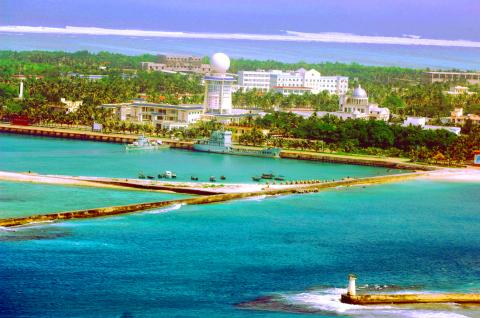In a move that risks increasing regional tensions, China yesterday announced it will invest more than 10 billion yuan (US$1.6 billion) to build infrastructure on disputed islands in the South China Sea and to strengthen marine law enforcement in the region.
Citing Hainan Province Governor Jiang Dingzhi (蔣定之), the Guangzhou-based 21st Century Herald reported that China would build an airport, piers and other important infrastructure on islands administered by Sansha (三沙), a prefecture-level city under Hainan’s jurisdiction that was created in July following approval by the State Council in June.
Located on Woody Island (Yongxing Island, 永興島), the largest island in the Paracels (Xisha Islands, 西沙群島) and 350km southeast of Hainan, Sansha “administers” more than 200 islets, sandbanks and reefs and their surrounding waters in the Spratly Islands (Nansha Islands, 南沙群島), Macclesfield Bank (Zhongsha Islands, 中沙群島) and the Paracel chains.

Photo: AFP
Some of the construction has already begun, the paper said, without providing details.
The Industrial and Commercial Administration Bureau of Hainan Province announced in September that the establishment of Sansha had caught the attention of investors, with the bureau receiving “multiple queries” about setting up businesses in Sansha.
A construction company and a tourism investment company received approval in August and September respectively, Chinese media said.
According to a report in Caijing magazine, officials in Sansha have been evaluating various commercial development plans, including the establishment of a tax haven and casino resorts.
While serving to create facts on the ground to bolster China’s sovereignty claims in the South China Sea, the investment projects have been a source of tension with other claimants, forcing Beijing to add a security component to the project.
In July, China’s Central Military Commission approved the creation of a military garrison on Sansha.
Taiwan, Vietnam, the Philippines, Malaysia and Brunei also have claims to some of the islets. Itu Aba Island (Taiping Island, 太平島), the largest islet in the Spratlys, is controlled by Taiwan.
According to the Herald, Jiang added that in addition to supporting infrastructure, the funds would be used to acquire marine law enforcement vessels and supply ships.
Under new rules announced last month and which are to come into effect on Tuesday next week, police in Hainan will have the authority to board and seize control of foreign ships that “illegally” enter Chinese waters. It remains unclear whether the directive only pertains to coastal areas near Hainan Island or to the entire body of water administered by Sansha.
Chinese media reported at the time that the government would also send new maritime surveillance ships to supplement the fleet responsible for patrolling the South China Sea.
Additional reporting by Bloomberg

SECURITY: As China is ‘reshaping’ Hong Kong’s population, Taiwan must raise the eligibility threshold for applications from Hong Kongers, Chiu Chui-cheng said When Hong Kong and Macau citizens apply for residency in Taiwan, it would be under a new category that includes a “national security observation period,” Mainland Affairs Council (MAC) Minister Chiu Chui-cheng (邱垂正) said yesterday. President William Lai (賴清德) on March 13 announced 17 strategies to counter China’s aggression toward Taiwan, including incorporating national security considerations into the review process for residency applications from Hong Kong and Macau citizens. The situation in Hong Kong is constantly changing, Chiu said to media yesterday on the sidelines of the Taipei Technology Run hosted by the Taipei Neihu Technology Park Development Association. With

CARROT AND STICK: While unrelenting in its military threats, China attracted nearly 40,000 Taiwanese to over 400 business events last year Nearly 40,000 Taiwanese last year joined industry events in China, such as conferences and trade fairs, supported by the Chinese government, a study showed yesterday, as Beijing ramps up a charm offensive toward Taipei alongside military pressure. China has long taken a carrot-and-stick approach to Taiwan, threatening it with the prospect of military action while reaching out to those it believes are amenable to Beijing’s point of view. Taiwanese security officials are wary of what they see as Beijing’s influence campaigns to sway public opinion after Taipei and Beijing gradually resumed travel links halted by the COVID-19 pandemic, but the scale of

A US Marine Corps regiment equipped with Naval Strike Missiles (NSM) is set to participate in the upcoming Balikatan 25 exercise in the Luzon Strait, marking the system’s first-ever deployment in the Philippines. US and Philippine officials have separately confirmed that the Navy Marine Expeditionary Ship Interdiction System (NMESIS) — the mobile launch platform for the Naval Strike Missile — would take part in the joint exercise. The missiles are being deployed to “a strategic first island chain chokepoint” in the waters between Taiwan proper and the Philippines, US-based Naval News reported. “The Luzon Strait and Bashi Channel represent a critical access

Pope Francis is be laid to rest on Saturday after lying in state for three days in St Peter’s Basilica, where the faithful are expected to flock to pay their respects to history’s first Latin American pontiff. The cardinals met yesterday in the Vatican’s synod hall to chart the next steps before a conclave begins to choose Francis’ successor, as condolences poured in from around the world. According to current norms, the conclave must begin between May 5 and 10. The cardinals set the funeral for Saturday at 10am in St Peter’s Square, to be celebrated by the dean of the College